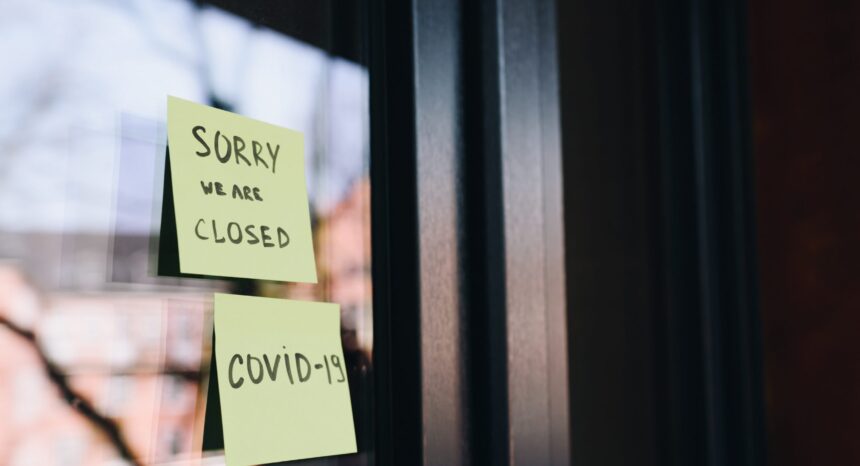Across the political divide, a majority of U.S. residents don’t think their states should reopen their economies yet, according to the results of a new national survey gauging public opinion on a wide range of topics related to COVID-19.
The survey, which polled nearly 23,000 respondents in all 50 states and Washington, D.C., was conducted April 17-26 by David Lazer, a political science and computer science professor at Northeastern University; Matthew A. Baum, a public policy and communications professor at Harvard Kennedy School; Katherine Ognyanova, an assistant professor of communications at Rutgers University; and John Della Volpe, the director of polling at Harvard Kennedy School.
“A bipartisan consensus opposes a rapid ‘reopening’ of the economy,” the researchers write in their 298-page survey report, which includes national-level response data as well as data for each individual state — including state-level margins of error. “Only 7% support immediate reopening of the economy, and the median respondent supports waiting four to six weeks. There is a bipartisan consensus on waiting (89% of Republicans as compared to 96% of Democrats opposed immediate re-opening), and Republicans support a somewhat faster re-opening of the economy than Democrats, where the median Republican supports waiting two to four weeks versus median Democrat six to eight weeks … even in those Republican-led states which are moving toward re-opening, few people support reopening immediately.”
Among the other key findings of the survey at the national level:
“The most trusted groups and organizations regarding the crisis embody expertise,” they report. “The Centers for Disease Control [and Prevention] (CDC) is the most trusted government entity, with nearly 9 in 10 (88%) indicating that they trusted the CDC ‘some’ or ‘a lot.’ A remarkable 96% indicate trust in hospitals and doctors (only 1% ‘not at all’); and 93% trusted scientists and researchers. This trust is bipartisan, but there are partisan differences in the degree of trust (i.e., ‘a lot’ versus ‘some’ trust), where 42% of Republicans versus 55% of Democrats report trusting the CDC a lot; 54% of Republicans versus 66% of Democrats report trusting scientists and researchers a lot; and 73% of Republicans versus 76% of Democrats report trusting doctors and hospitals a lot.”
News media don’t fare as well on the trust scale, with 41% of respondents reporting they trusted the news media “some,” and 13% “a lot.”
In terms of where U.S. residents receive information about the COVID-19 crisis, “Television ranks at the top as a source of information, with local television cited by 55% and network television by 48%. Older (65+) Americans were more likely to rely on local television (70%), network television (60%), cable television (48%), as compared to younger (18-24-year-olds) Americans (41%, 39%, 32%, respectively).”
Some key findings at the state level:
“Residents of all 50 states are more concerned about their own and their family’s risks of contracting COVID-19 than about losing their jobs or suffering financial hardships,” the researchers report. “But comparing average levels of concern over contracting the virus (self and family) with average levels of economic concern (jobs and finances), this differential, which averages 19 percentage points, varies widely across the states (from a low of 9 percentage points in Colorado to a high of 31 points in Maine). Residents of New York, Connecticut and Rhode Island top the states in terms of concerns over contracting COVID with 80% or more of respondents, on average, indicating concern (“somewhat” or “a great deal”) over the risk to themselves or their family members. Nevada and Hawaii residents are most concerned about jobs and financial hardships, with 62% of respondents in both states expressing such concerns, followed by New Jersey at 61%, and then Texas, Arkansas, and New York, at 60%.”
“In every state in the union, residents approve of their own governor’s handling of the COVID crisis (defined as ‘approve’ or ‘strongly approve’) more highly than they rate that of President Trump,” the researchers report. “The average gap across the 50 states was 22 percentage points (66% for governors compared to 44% for Trump). That said, the gaps between the governor and the president vary widely, ranging from around 2 percentage points in Oklahoma to a cavernous gap approaching or exceeding 40 points in several solidly Democratic states, like Rhode Island and California. Interestingly, three of the four states with the largest such gaps (40-42 percentage points) are reliably blue states with Republican governors: Maryland, Massachusetts, and Vermont. The highest rated governors include the governors of Ohio (83%), Kentucky (81%), Maryland (80%), and Massachusetts (80%).”
If you would like to embed the map in this piece in your own online publication, you can do so with this code: <iframe src=”//datawrapper.dwcdn.net/9QSsB/1/” width=”100%” height=”620″ scrolling=”no” frameborder=”0″ allowtransparency=”true”></iframe>
For more information, please check out our other coronavirus-related resources, including tips on covering biomedical research preprints and a roundup of research that looks at how infectious disease outbreaks affect people’s mental health.


Expert Commentary